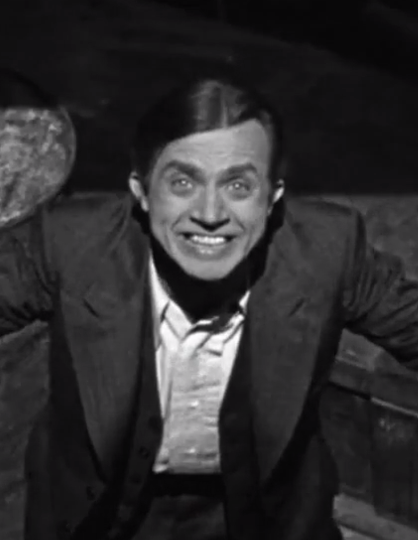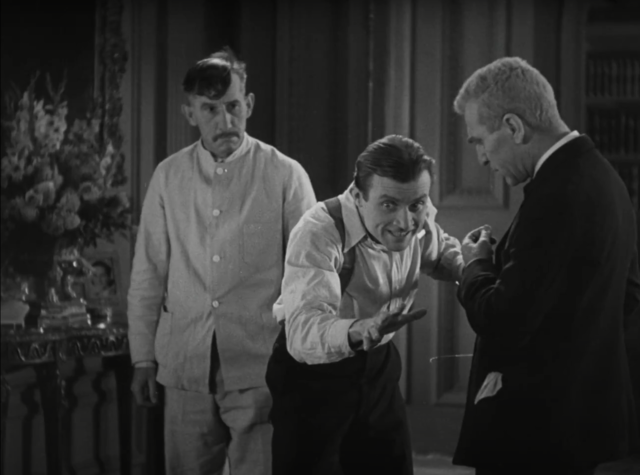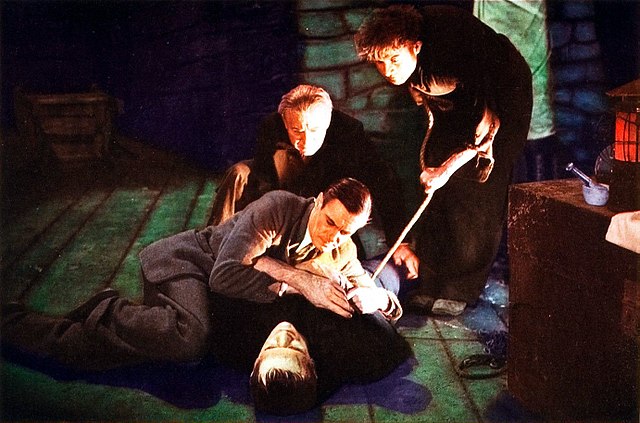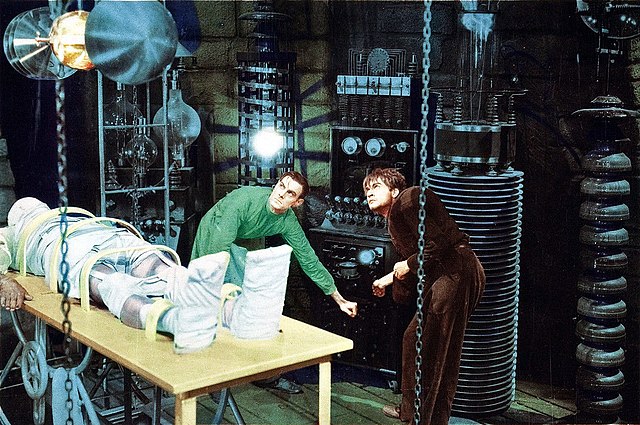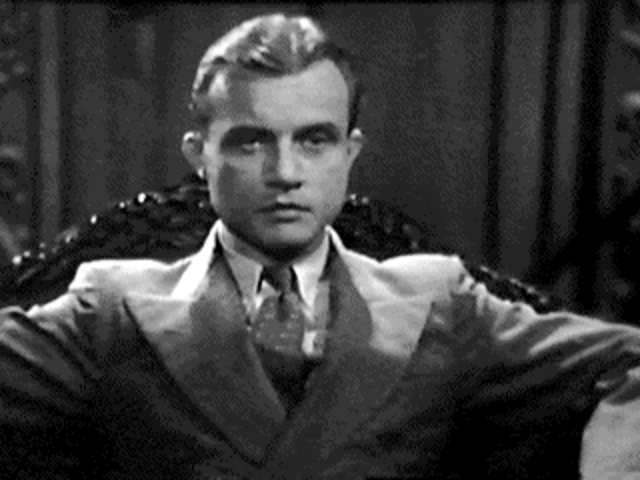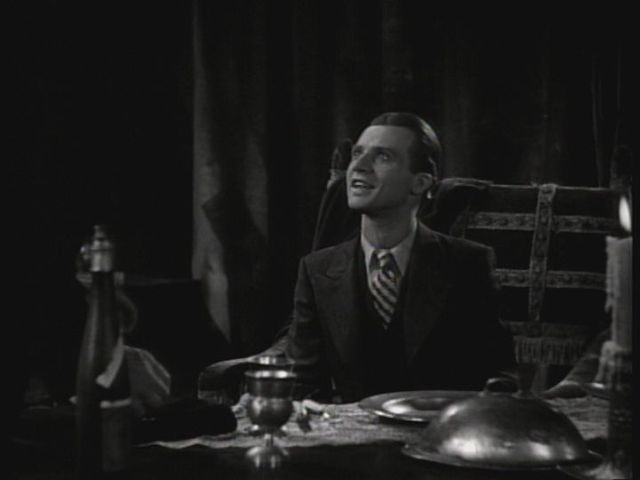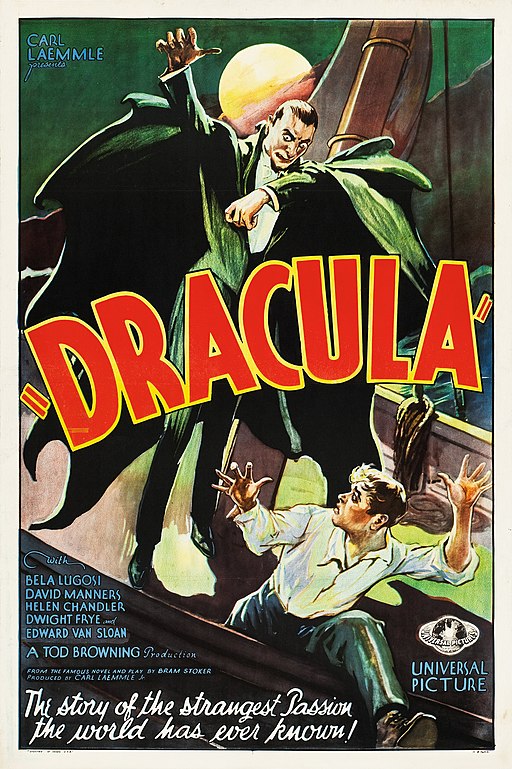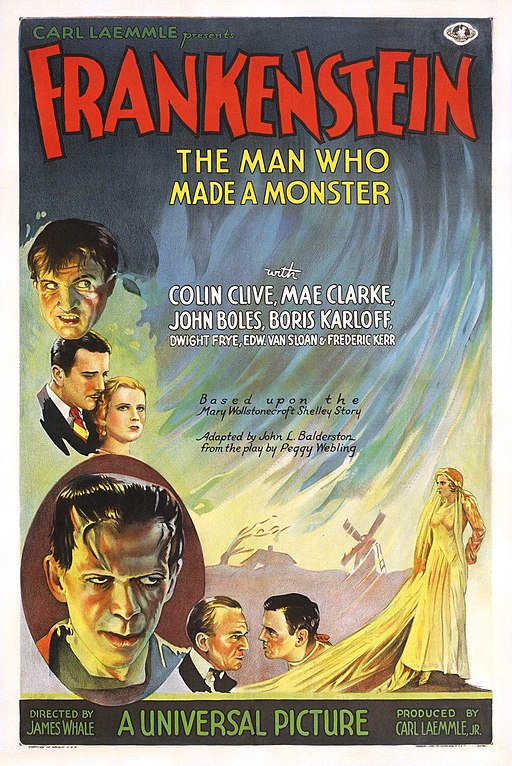Dwight Frye
back| Full Name | Dwight Iliff Fry |
| Stage Name | Dwight Frye |
| Born | February 22, 1899 |
| Birthplace | Salina, Kansas, USA |
| Died | November 7, 1943 |
| Buried | Forest Lawn Memorial Park, Glendale, California, USA |
| Married to | Laura Mae Bullivant (married in 1928) |
| Children | Dwight David Frye |
| Notable films | Dracula (1931) - Frankenstein (1931) - Bride of Frankenstein (1935) - The Invisible Man (1933) - Dead Men Walk (1943) |
Dwight Frye
The Man with the Thousand-Watt Stare
Dwight Frye was a notable American actor renowned for his roles in classic horror films. He gained fame as Renfield in Dracula (1931) and Fritz in Frankenstein (1931), where his intense performances left a lasting impact.
Frye's expressive physicality and versatile vocal range made his portrayals of madness and menace unforgettable.
Tragically, Frye died of a heart attack on November 7, 1943, at age 44. Though he received no major awards during his lifetime, Frye's legacy endures through his significant contributions to the horror genre, celebrated by fans and film historians alike.
Related
Dwight Frye (1899 – 1943)
Biography and Career Overview
Dwight Iliff Fry, known professionally as Dwight Frye, was an American actor best known for his roles in classic horror films of the 1930s. Born on February 22, 1899, in Salina, Kansas, Frye developed an early interest in the performing arts, moving to Denver, Colorado, where he became involved in local theater productions.
Frye moved to Hollywood in the late 1920s, where he initially found work in silent films and stage productions. His big break came with the advent of sound films, and he gained widespread recognition for his performance as Renfield in Tod Browning's Dracula (1931). Frye's portrayal of the mad, insect-eating assistant to Bela Lugosi's Count Dracula remains iconic, showcasing his ability to embody intense and disturbed characters.
That same year, Frye cemented his status in horror cinema with his role as Fritz, the hunchbacked assistant in James Whale's Frankenstein. His performance, marked by a mix of menace and pathos, helped define the character of the mad scientist's assistant in popular culture.
Throughout the 1930s, Frye continued to appear in a series of horror films, often typecast in similar roles. He appeared in The Vampire Bat (1933) as the simple-minded Herman Gleib, and in Bride of Frankenstein (1935) as Karl, further solidifying his reputation as a character actor capable of delivering memorable performances in the horror genre.
Despite his success in horror films, Frye struggled with being typecast, which limited his opportunities in other types of roles. He continued to work steadily in both film and stage productions, though his career never quite reached the heights of his early successes.
Frye's life was tragically cut short when he suffered a heart attack on a Los Angeles city bus on November 7, 1943. He was only 44 years old. His sudden death was a great loss to the film industry, particularly to the horror genre, where his performances had left an indelible mark.
Dwight Frye was buried at Forest Lawn Memorial Park in Glendale, California. He was survived by his wife, Laura Mae Bullivant, and their son, Dwight David Frye. His legacy endures through his unforgettable contributions to early horror cinema, with his performances continuing to inspire and terrify audiences to this day.
The Life and Death of Dwight Frye:
Intense Acting Style of Dwight Frye:
Dwight Frye's acting style is a distinctive blend of intensity, expressiveness, and an ability to evoke a range of emotions from the audience, particularly within the horror genre.
Expressive Physicality
Frye was known for his highly expressive physicality. He often used exaggerated body movements and gestures to convey the mental state of his characters, which was especially effective in his roles as unhinged or tormented individuals. His physicality added a layer of drama and urgency to his performances, making his characters memorable and impactful.
Versatile Facial Expressions
Frye's facial expressions were a key component of his acting. He had a remarkable ability to contort his face to express fear, madness, or malevolence. This versatility was particularly evident in his portrayal of Renfield in Dracula and Fritz in Frankenstein, where his wide-eyed, manic looks conveyed his characters' inner turmoil and obsession.
Vocal Range and Delivery
Frye's vocal performance was another hallmark of his acting style. He had a distinctive voice that could range from a soft, almost whispering tone to a loud, hysterical pitch. This dynamic range allowed him to effectively portray characters on the brink of insanity or deeply troubled, adding a haunting quality to his performances.
Commitment to Character
Frye was deeply committed to his roles, often immersing himself fully into the character's psyche. This commitment is evident in the way he portrayed Renfield's descent into madness or Fritz's malevolent loyalty to Dr. Frankenstein. His dedication to his roles helped create authentic and compelling characters that resonated with audiences.
Eerie and Unsettling Presence
Frye had an uncanny ability to create an eerie and unsettling presence on screen. Whether playing a deranged assistant or a crazed vampire servant, his performances often left a lasting impression of unease. His portrayal of psychologically complex characters brought a sense of realism to the horror elements of the films he starred in.
Subtle Nuances
Despite often playing characters that required over-the-top expressions and actions, Frye was also adept at incorporating subtle nuances into his performances. He could convey a range of emotions with minimalistic gestures or brief changes in his expression, adding depth and complexity to his roles.
Influence of Stage Acting
Frye's background in stage acting influenced his film performances. The theatricality and larger-than-life quality of his acting can be traced back to his stage roots, where exaggerated expressions and movements were necessary to reach the entire audience. This theatrical influence translated well to his film roles, especially in the horror genre, where dramatic and intense performances were required.
Typecasting and Its Impact
While Frye's distinctive style made him perfect for certain types of roles, it also led to him being typecast as the mad or sinister character. This typecasting limited his opportunities to explore a wider range of characters, but it also solidified his place as a memorable and iconic figure in horror cinema.
Legacy
Frye's acting style has left a lasting legacy in the horror genre. His ability to portray madness and menace with such intensity and authenticity has influenced many actors who followed in his footsteps. His performances continue to be celebrated for their originality and impact, making Dwight Frye a significant figure in the history of cinema.
In summary, Dwight Frye's acting style was marked by a unique blend of physical expressiveness, vocal versatility, and deep commitment to his roles. His ability to convey complex emotions and create an unsettling presence made him an unforgettable actor, particularly in the realm of horror films.
Awards and Recognition:
Dwight Frye's career, though notable for his memorable roles in classic horror films, did not garner significant formal recognition in the form of awards or nominations during his lifetime. This lack of recognition can be attributed to several factors:
Lack of Major Awards during His Time
During the period when Frye was most active in Hollywood (late 1920s to early 1940s), the film industry was not as prolific in bestowing awards and recognitions as it is today. The Academy Awards, established in 1929, focused primarily on major categories such as Best Actor, Best Actress, and Best Picture, often overlooking character actors and those in supporting roles.
Genre Bias
The horror genre, in which Frye predominantly worked, was not typically recognized by major awards organizations. Historically, genre films, particularly horror, have been underappreciated by awards bodies, which tend to favor dramas and more traditionally prestigious genres.
Posthumous Recognition
While Dwight Frye did not receive significant awards or nominations during his lifetime, his contributions to the film industry, especially in horror cinema, have been acknowledged posthumously. His performances in Dracula and Frankenstein are frequently cited in discussions of classic horror cinema, and he is remembered as an iconic figure in the genre.
Legacy and Cult Status
Despite the absence of formal awards, Frye's work has achieved a cult status. His portrayals of Renfield in Dracula and Fritz in Frankenstein have become iconic, influencing the portrayal of similar characters in subsequent horror films and popular culture. Film historians and horror aficionados often celebrate his contributions to the genre.
Honors and Tributes
In later years, Frye has been honored in various ways:
- Retrospectives and Film Festivals: His films have been showcased in retrospectives and horror film festivals, celebrating his contributions to early horror cinema.
- Books and Documentaries: Frye's life and career have been the subject of books and documentaries, highlighting his impact on the genre and his unique acting style.
- Cultural References: Frye's performances and characters have been referenced in various media, underlining his enduring influence.
Memorable Film Lines:
As Renfield in Dracula (1931):
- Renfield: "Rats! Rats! Rats! Thousands! Millions of them! All red blood, all these will I give you! Yes, and more, like the sparrows and the kittens!"
This quote captures Renfield’s descent into madness and his obsession with his master, Count Dracula.
- Renfield: "He came and stood below my window in the moonlight, and he promised me things. Not in words, but by doing them."
Here, Renfield describes his encounter with Dracula, reflecting the supernatural influence the Count has over him.
As Fritz in Frankenstein (1931):
- Fritz: "It's alive! It's alive!"
Although often attributed to Dr. Frankenstein, Fritz's excitement and horror at the creation of the monster are palpable in the scenes where he assists in bringing the creature to life.
As Karl in Bride of Frankenstein (1935):
- Karl: "They'll never let you go. You'll die here like an animal, like a rat in a trap."
Karl expresses the hopelessness and dire situation they are in, adding to the film’s tension and dark atmosphere.
Quotes About Dwight Frye:
Though not direct quotes from Frye himself, these reflect the perception and impact of his performances:
- Bela Lugosi on Frye’s Performance in Dracula:
"Dwight was superb. His Renfield added a layer of eeriness to the film that I couldn’t have achieved alone."
- James Whale, Director of Frankenstein:
"Frye had an intensity and dedication that brought Fritz to life in a way no other actor could have."
Movies Starring Dwight Frye:
1928
The Night Bird
- Synopsis: A silent film about a young woman who falls into the clutches of a gang of jewel thieves, only to be rescued by a newspaper reporter.
1931
Dracula
- Synopsis: Frye plays Renfield, an estate agent who becomes the insane servant of Count Dracula after visiting his castle in Transylvania.
Frankenstein
- Synopsis: Frye plays Fritz, the hunchbacked assistant to Dr. Frankenstein who helps create the monster from body parts, leading to tragic and horrifying consequences.
The Black Camel
- Synopsis: A murder mystery featuring Charlie Chan, who is called to solve the murder of a film star in Hawaii.
1932
The Western Code
- Synopsis: A Western film in which a rancher fights against cattle rustlers, featuring Frye in a supporting role.
1933
The Vampire Bat
- Synopsis: Frye plays Herman Gleib, a simple-minded man suspected of being a vampire when villagers begin dying mysteriously.
The Circus Queen Murder
- Synopsis: A detective investigates a series of murders in a circus, with Frye appearing in a supporting role.
The Invisible Man
- Synopsis: Frye plays a reporter in this science fiction horror film about a scientist who discovers how to make himself invisible but becomes insane in the process.
The World Gone Mad
- Synopsis: A crime drama about corruption in the financial world, with Frye in a supporting role.
1934
The Crime of Helen Stanley
- Synopsis: A mystery film where Frye appears in a minor role, revolving around the murder of a famous actress.
1935
Bride of Frankenstein
- Synopsis: Frye plays Karl, one of Dr. Frankenstein's assistants, in this sequel to Frankenstein, where the monster demands a mate.
The Lives of a Bengal Lancer
- Synopsis: An adventure film set in British India, with Frye in a small role as a native informant.
Remember Last Night?
- Synopsis: A comedy-mystery about a group of friends trying to recall what happened during a drunken party that ended with a murder.
Death from a Distance
- Synopsis: A mystery film about a scientist solving a murder at an observatory, with Frye in a supporting role.
The Adventures of Frank Merriwell
- Synopsis: A film serial following the adventures of the title character, with Frye in a minor role.
1936
Absolute Quiet
- Synopsis: A drama about a man who stages his own death to escape his problems, with Frye in a supporting role.
1937
The Great Hospital Mystery
- Synopsis: A mystery set in a hospital, where Frye plays a suspicious orderly.
1939
Son of Frankenstein
- Synopsis: Frye appears in a small role as a villager in this third installment of the Frankenstein series.
The Hunchback of Notre Dame
- Synopsis: A film adaptation of Victor Hugo's novel, with Frye in a minor role.
They Asked for It
- Synopsis: A crime drama where Frye appears in a minor role.
The Crime of Doctor Hallet
- Synopsis: A drama about a doctor whose experiments with jungle fever lead to tragedy, with Frye in a supporting role.
1940
The Man with Nine Lives
- Synopsis: A horror film about a scientist who discovers a way to freeze people, with Frye in a supporting role.
1941
The Ghost of Frankenstein
- Synopsis: Frye plays a villager in this continuation of the Frankenstein saga.
1942
Dead Men Tell
- Synopsis: A Charlie Chan mystery where Frye appears in a minor role.
1943
Frankenstein Meets the Wolf Man
- Synopsis: Frye plays Rudi, a villager, in this crossover horror film where Frankenstein's monster meets the Wolf Man.
Dead Men Walk
- Synopsis: Frye plays Zolarr, the assistant to a doctor whose twin brother returns from the dead as a vampire.

